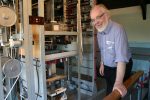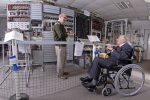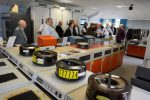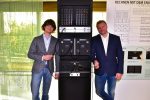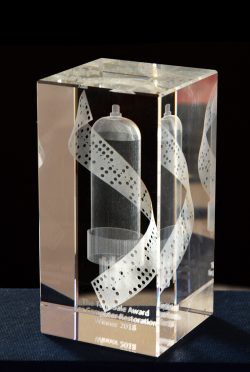
Three generations of flight simulators – navigating towards virtual worlds
The 2018 Tony Sale Award (TSA) for computer conservation has been won by a project to restore three generations of flight simulators.
The Center for Technology and Innovation (Techworks!) in Binghamton, New York, USA, has brought back to life a Second World War analogue flight simulator, a 1960s solid-state hardware version and a digital simulator from the 1980s. The public has been able to experience each of the three ‘Pilot Makers’ to grasp the pace of innovation and development of simulation technology.
Run by the Computer Conservation Society and sponsored by Google UK, the TSA has been held every two years since 2012 and each time demonstrates the growing interest in computer conservation across the world.
Prof Martin-Campbell-Kelly, chair of the Computer Conservation Society TSA judging panel, congratulated the winners, “In reproducing novel computing applications which the public can experience first-hand, the Techworks! team gives us an unforgettable impression of the early days of virtual worlds. Excellent research, skilled implementation and an impactful result make this a superb example of the power and relevance of computer conservation, something that I know would have met with the late Tony Sale’s enthusiasm and approval.”
The Techworks! project was inspired by the simulation industries in its local area of Binghamton, widely regarded as the birthplace of flight simulation. The restoration of the three simulators has presented very different challenges requiring contrasting skillsets.
A commitment to continuing to improve public access to the simulators aims to ensure that the value of computer conservation and the early developments in our digital world can be widely appreciated.
Previous winners of the Tony Sale Award have been the Heinz-Nixdorf MuseumsForum for its evocative and educational reconstruction showing how ENIAC, one of the first electronic computers, was programmed (2016); the IBM 1401 Demo Lab, a restoration of one of the most significant machines in computer history by the Computer History Museum in California, and Z1 Architecture and Algorithms, a virtual reconstruction of the 1930’s Konrad Zuse mechanical computer by the Free University of Berlin (2014 joint winners); and David Link’s computer art installation, Loveletters (2012).
Short-listed Projects
- A reconstruction of Clementina, a Ferranti Mercury computer and the first scientific computer in Argentina, by the Museo de Informática ICATEC in Buenos Aires.
- A restoration of the EL-X8 computer by the Electrologica Foundation at the Rijksmuseum Boerhaave, The Netherlands in honour of EW Dijkstra, a Dutch computer science pioneer. The EL platform enabled Dijkstra to win the Association for Computing Machinery Turing Award in 1972.
- The US-based SIMH Computer History Simulation Project, aims to provide a second life for computer software when the original hardware is no longer available. The SIMH simulator and machine description scheme provide a mechanism for resurrecting historical software, particularly that of the Digital Equipment Corporation ranges.
- The Virtual Colossus Project by Martin Gillow is a simulation of the Colossus, as rebuilt by Tony Sale, plus a simulation of the Lorenz cypher machine which runs on any web browser. The Lorenz cipher machine was used by German High Command during the Second World War. The routine breaking of Lorenz was greatly accelerated by Colossus.
















